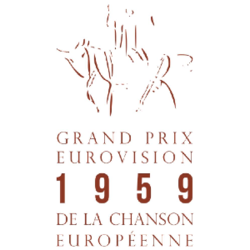
The Eurovision Song Contest 1956 was the first edition of the annual Eurovision Song Contest, organised by the European Broadcasting Union (EBU) and host broadcaster Radio svizzera italiana (RSI) on behalf of the Swiss Broadcasting Corporation. The contest, originally titled the Gran Premio Eurovisione 1956 della Canzone Europea, was held on Thursday 24 May 1956 at the Teatro Kursaal in Lugano, Switzerland, and hosted by Swiss television presenter Lohengrin Filipello, which remains the only time that the contest has been hosted by a solo male presenter.
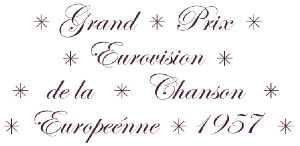
The Eurovision Song Contest 1957 was the second edition of the annual Eurovision Song Contest. Organised by the European Broadcasting Union (EBU) and host broadcaster Hessischer Rundfunk (HR) on behalf of ARD, the contest, originally known as the Grand Prix Eurovision de la Chanson Européenne 1957 was held on Sunday 3 March 1957 and was hosted at the Großer Sendesaal des hessischen Rundfunks in Frankfurt, West Germany by German actress Anaid Iplicjian.
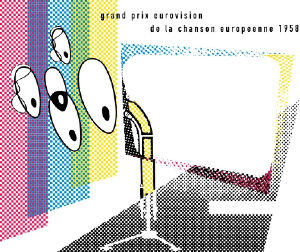
The Eurovision Song Contest 1958 was the third edition of the annual Eurovision Song Contest. Organised by the European Broadcasting Union (EBU) and host broadcaster Nederlandse Televisie Stichting (NTS), the contest, originally known as the Grand Prix Eurovision de la Chanson Européenne 1958 was held on Wednesday 12 March 1958 at the AVRO Studios in Hilversum, the Netherlands and hosted by Dutch television presenter Hannie Lips. This marked the first time that the contest was hosted in the country of the preceding year's winner, a tradition that has been continued ever since.

The Eurovision Song Contest 1960 was the fifth edition of the annual Eurovision Song Contest, held on Tuesday 29 March 1960 at the Royal Festival Hall in London, United Kingdom, and hosted by British television presenter and actress Catherine Boyle. Organised by the European Broadcasting Union (EBU) and host broadcaster the British Broadcasting Corporation (BBC), the United Kingdom was offered the rights to stage the contest after the Netherlands, which had won the 1959 contest, declined the opportunity after having organised the event in 1958.
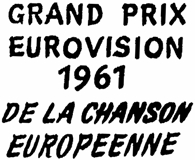
The Eurovision Song Contest 1961 was the 6th edition of the annual Eurovision Song Contest. Once again, the contest was held in the French seaside city of Cannes, having also hosted the 1959 edition. Organised by the European Broadcasting Union (EBU) and host broadcaster Radiodiffusion-Télévision Française (RTF), the contest was again held at the Palais des Festivals et des Congrès on Saturday 18 March 1961, becoming the first contest to take place on a Saturday evening, a tradition that has continued ever since. The show was directed by Marcel Cravenne and again hosted by Jacqueline Joubert, who had also hosted in 1959.

The Eurovision Song Contest 1995 was the 40th edition of the Eurovision Song Contest, held on 13 May 1995 at the Point Theatre in Dublin, Ireland. Organised by the European Broadcasting Union (EBU) and host broadcaster Radio Telefís Éireann (RTÉ), and presented by Mary Kennedy, the contest was held in Ireland following the country's victory at the 1994 contest with the song "Rock 'n' Roll Kids" by Paul Harrington and Charlie McGettigan. It was the third consecutive contest to be held in Ireland – the first and only time in the history of the event that a country has hosted three editions in a row – and the second consecutive edition to be held in the Point Theatre in Dublin.

The Eurovision Song Contest 1989 was the 34th edition of the Eurovision Song Contest, held on 6 May 1989 in the Palais de Beaulieu in Lausanne, Switzerland. Organised by the European Broadcasting Union (EBU) and host broadcaster Télévision suisse romande (TSR) on behalf of the Swiss Broadcasting Corporation, and presented by Jacques Deschenaux and Lolita Morena, the contest was held in Switzerland following the country's victory at the 1988 contest with the song "Ne partez pas sans moi" by Céline Dion.

The Eurovision Song Contest 1984 was the 29th edition of the Eurovision Song Contest, held on 5 May 1984 in the Théâtre Municipal in Luxembourg City, Luxembourg. Organised by the European Broadcasting Union (EBU) and host broadcaster Radio Télévision Luxembourg (RTL), the contest was held in Luxembourg following the country's victory at the 1983 contest with the song "Si la vie est cadeau" by Corinne Hermès. The event was presented by Désirée Nosbusch, who, at 19 years old, remains the youngest person to have hosted the contest as of 2024.
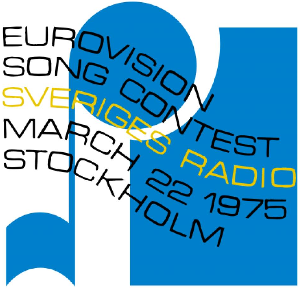
The Eurovision Song Contest 1975 was the 20th edition of the Eurovision Song Contest, held on 22 March 1975 in the Sankt Eriks-Mässan in Stockholm, Sweden. Organised by the European Broadcasting Union (EBU) and host broadcaster Sveriges Radio (SR), and presented by Karin Falck, the contest was held in Sweden following the country's victory at the 1974 contest with the song "Waterloo" by ABBA.

The Eurovision Song Contest 1996 was the 41st edition of the Eurovision Song Contest, held on 18 May 1996 at the Oslo Spektrum in Oslo, Norway. Organised by the European Broadcasting Union (EBU) and host broadcaster Norsk rikskringkasting (NRK) and presented by Ingvild Bryn and Morten Harket, the contest was held in Norway following the country's victory at the 1995 contest with the song "Nocturne" by Secret Garden.
The United Kingdom selected their entry for the Eurovision Song Contest 1996 in Oslo, Norway with a new show, The Great British Song Contest. The winning entry was Gina G with "Ooh Aah... Just a Little Bit".

The Netherlands has participated in the Eurovision Song Contest 64 times since making its debut as one of the seven countries at the first contest in 1956. The country has missed only four contests, twice because the dates coincided with Remembrance of the Dead, and twice because of being relegated due to poor results the previous year. It has missed the final despite qualifying once, in 2024, due to the personal conduct of its entrant which led to disqualification. The Netherlands has hosted the contest five times: in Hilversum (1958), Amsterdam (1970), The Hague, and Rotterdam (2021).

France has participated in the Eurovision Song Contest 68 times since its debut at the first contest in 1956. France is one of only seven countries to be present at the first contest, and has been absent from only two contests in its history, missing the 1974 and 1982 contests. Along with Germany, Italy, Spain, and the United Kingdom, France is one of the "Big Five" countries that are automatically prequalified for the final, due to being the largest financial contributors to the European Broadcasting Union (EBU). France has won the contest five times.

Monaco has participated in the Eurovision Song Contest 24 times since its debut in 1959. The country's only win in the contest came in 1971, when Séverine performed "Un banc, un arbre, une rue". As a result, Monaco was expected to host the contest in 1972, but it ultimately declined. Monaco is the only microstate to have won the contest to date.
Belgium debuted in the Eurovision Song Contest 1956, held on 24 May 1956 at the Teatro Cursaal in Lugano, Switzerland. The Walloon broadcaster INR organised a national final to determine two Belgian entries for the contest. Held on 15 April 1956, the event saw ten songs compete to be the Belgian entries; the results were determined by the jury panel and postcard voting. The songs "Messieurs les noyés de la Seine" by Fud Leclerc and "Le plus beau jour de ma vie" by Mony Marc were selected to represent the nation. Belgian entries performed 3rd and 10th, respectively, out of the 14 entries competing in the contest.
The Netherlands was represented by duo Maxine and Franklin Brown, with the song "De eerste keer", at the 1996 Eurovision Song Contest, which took place in Oslo on 18 May.
Hungary chose Gjon Delhusa, with the song "Fortuna", to be their representative at the 1996 Eurovision Song Contest. However, Hungary was one of seven countries which failed to qualify for the Eurovision final from a pre-qualifying round, so they were not represented in Oslo.
Croatia selected its entry for the 1996 Eurovision Song Contest through the "Dora 1996" contest, which was held on 3 March 1996, organised by the Croatian national broadcaster Hrvatska radiotelevizija (HRT) in Opatija. The winner was Maja Blagdan with "Sveta ljubav".
